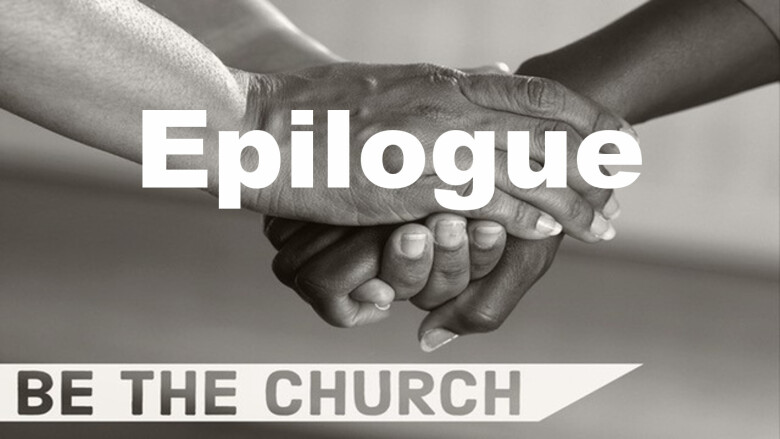Epilogue: Salt
Matthew 5:13
Be the Church: Epilogue (Part 1)
Matthew 5:13-16 ~ June 23, 2019
This week and next week, we are revisiting our theme, “Be the Church.” I’m calling this mini-series, “Be the Church: Epilogue.” An epilogue is a concluding part added to the end of a work.
Hopefully, since last September, we’ve learned a lot about what it means to be the church. Hopefully, on June 2, we learned the going to church and being the church are not at all the same things.
Since June 2, I’ve had some questions going through my mind. (Let me explain my references to June 2 in case you haven’t been with us and don’t know what that means. On June, we did something we called, “be the church Sunday.” Instead of coming to church that day, we served our community in a variety of ways including picking up trash, washing police cars, serving breakfast to first responders, and conducting services at nursing homes and a rescue mission.)
As I said, I’ve had some questions going through my mind: (1) Should we do it again? (2) If so, when? (3) What should we do differently? (4) What should we keep the same? (5) Are there better and/or different ways to serve our community?
I’ve had some thoughts concerning those questions and some of those thoughts have brought more questions: (1) I think we definitely need to do it again. (2) Perhaps we should make the first Sunday of June an annual be the church Sunday. (3) How can we effectively be the church more than once a year? (4) How can we most effectively be the church year-round?
All these
I have not been able to get this out of my mind. There is so much going on with those words.
- Christian salt has no business to remain snugly in elegant little ecclesiastical salt cellars
- our place is to be rubbed into the secular community…to stop it going bad
- when society does go bad, we Christians tend to throw up our hands in pious horror and reproach the non-Christian world; but should we not rather reproach ourselves?
- One can hardly blame unsalted meat for going bad. It cannot do anything else. The real question to ask is: Where is the salt?
I can’t help but wonder how God’s family might grow if we spent more time being the church. What if we get out of the saltshaker and into the community more often? How might God use us if we love our community by serving its needs?
The idea of being salt did not originate with John Stott; Jesus gave us that designation long ago. Matthew 5:13 (NIV) – You are the salt of the earth. But if the salt loses its saltiness, how can it be made salty again? It is no longer good for anything, except to be thrown out and trampled underfoot.
We become the salt of the earth when we come to know Christ as savior. So, the question is, are we going to get out of the saltshaker or are we going to stay in it? The answer is that we’re going to get out of the saltshaker and we’re going to do that because people need to know Jesus as savior. This is the most important need in every person’s life. However, before we can attempt to meet that need, we often need to start farther back on the road than we might think.
Karl
Helping people come to faith in Jesus used to be as easy as 1-2-3.
- Invite a friend to church.
2. The friend comes to church.
3. The preacher closes the deal.
He then points out that the most important part of the first step is not the invitation but having a friend who makes the invitation. For us, this means the most important part of being the church shouldn’t happen on a special Sunday morning or during any other church-wide event. They are helpful, and they are necessary, but they’re not the most important part. The most important part of being the church is the need for you and me to be friends to the people in our community. Vaters writes that people become willing to consider Jesus when they like and trust the Christians they know. People need to know us before they can trust us, and they need to trust us before they’ll go to church with us. We have to be the church before they’ll go to church.
Think about it. The salt in your pantry or cupboard at home isn’t performing any function of salt. The salt in the shaker next to your stove isn’t performing a single function of salt. The salt in the shaker on your kitchen or dining room table isn’t performing a single function of salt. In all those cases, the salt is sitting there, ready and able to perform its function. In order to do so, it must be out of the saltshaker.
In the same way, we’ve got to get out of the saltshaker and into our community and we can’t only do it on a few special occasions a year, we need to do it as part of our normal, everyday lives.
The question now becomes, how do we do that? Instead of listing all the possible activities you might be involved in, let me go back to Karl Vaters’ blog entry, “11 Ways to Be the Church for Those Who Don’t Go to Church.”
- Pray for them.
Not in the Facebook way, but actually praying for folks. We need to make it a priority to pray for our unchurched family, friends, co-workers, and neighbors. All the strategies and friendliness in the world won't make any difference without this. - Build relationships with no strings attached.
People are people, not projects. They always know when they are. They can smell it. When someone doesn't want to be recruited, stop recruiting and just love peoplelike Jesus did. He’ll take care of the rest. - Play the long game.
- No matter how long it takes, in the light of eternity, it's more than worth the investment.
- Live with integrity.
- Integrity may be the
most-needed , but least-evident character trait in society. Virtually every poll shows that people have less faith in our major institutions, including the church than ever. The reason? Lack of integrity. - We need to live upright lives. Holy lives. Honest and transparent lives.
- Trust is easy to lose and hard to earn. And it’s even harder to earn back. Again, it’s about the long game.
- Integrity may be the
- Talk about life, not just about church.
- Real life is never just about one subject.
- If Jesus influences every area of our lives (which he does), then we should connect with people in every area of our lives, including the non-churchy parts.
- Don’t connect faith to politics or denominations.
- The gospel is bigger than our political parties, national pride, denominations, and creeds combined.
- We need to stop talking as if every Christian shares our political view or denominational
distinctives . - When we assume that every Christian is
a ( our political party), we cut ourselves off from people who might be interested in Jesus but don’t want to bea ( our political party). - Let’s stop making Jesus so small.
- Be more joyful and less mean.
- “Blessed are the nice” is not one of the Beatitudes.
- Jesus didn’t come to make us nice. He came to make us holy. To redeem us from sin. And he was crucified for it. Nice guys don’t get crucified.
- So I'm not a fan of the
nicey -nice gospel. But I have even less tolerance for a mean gospel. - There are too many mean Christians around us. Why would people want to sign up for that?
- Live joyfully. It’s deeper than niceness, stronger than meanness, and rabidly contagious.
- Live a life of scandalous generosity.
- Generosity without agenda is scandalous. It defies everything our culture stands for. But, too often, the church enforces greed instead of fighting it.
- It's time for the church to be known as the crazy people who are always giving things away. Let's show people that faith in Jesus is more about giving than receiving.
- Be authentic, even if it means being different.
- Don't hide your quirks; embrace them. If Jesus doesn't cause us to live differently, what's the point?
- But here's the challenge: we need to live differently without coming across as "look at me, I'm better than you." Because we’re not.
- For the best example of how to do this well, look at the life of Jesus.
- Be available.
- Most people who come to Jesus as adults do so because of trauma. God hard-wired us to reach out for help when bad things happen.
- People don't reach out to a church when they're hurting, they reach out to a friend. And if that friend is also a believer, then that friend can bring Jesus in just when he’s needed the most.
- But we must resist the temptation to switch into recruitment mode when people are in trauma. There are few things more inappropriate than leveraging someone else's pain for our own agenda even if that agenda is a good one.
- When people are hurting, be available and let Jesus do the rest.
- Make fewer statements and have more conversations.
- The best way to start doing that is to listen.
- But we like making statements. We like to get the Facebook echo chamber humming.
There’s a time and place for big truths to be declared with big, bold statements.- Jesus did it. So should we.
- But when all of our Christian communication is about making big statements, we lose the chance to have small conversations.
- Jesus had small conversations. On big subjects.
- That’s where he earned people’s trust. That’s where we’ll earn it, too.
Folks, for those of us who know Jesus as our savior, we are the salt of the earth. The most important question is whether we’re going to get out of the saltshaker or sit idly by and do nothing at all while people die and go to hell.
I realize that sounds harsh, but it’s the truth.
So, what’s it gonna be for you. In the saltshaker or out of it?
Prayer
1 https://www.christianitytoday.com/karl-vaters/2015/october/11-ways-to-be-church-for-those-who-dont-go-to-church.html
Series Information

Some concluding thoughts on our "Be the Church" theme using Jesus' descriptions of his followers as salt and light.
